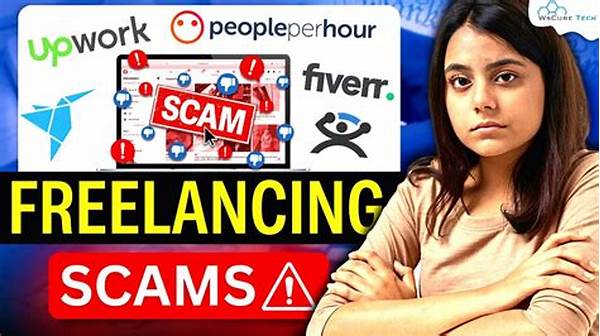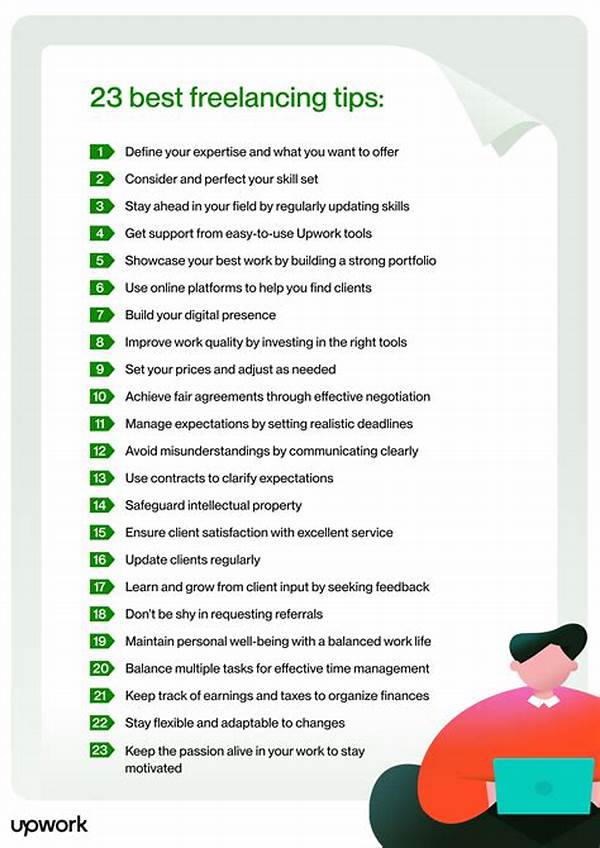
Navigating the freelancing platforms can be a daunting task, especially with the myriad of scams waiting to ensnare unsuspecting freelancers. It’s akin to traversing a minefield, where one wrong step might cost you not just your hard-earned money, but your reputation as well. Learn how to avoid scams in freelancing platforms by profiling some common pitfalls and adopting strategies to protect yourself. Often, newbies to these platforms are bombarded with offers that seem too good to be true. And why wouldn’t they be? The lure of high pay for minimal effort is a classic bait. But, as many have learned the hard way, if it sounds too good to be true, it probably is. Let’s embark on a journey that teaches you how to identify these traps and break free from the chains of deceit, ultimately carving a path to a more secure freelance career.
Read More : How To Start Freelancing With No Experience
Avoiding the Lure of Easy Money
In the world of freelancing, everyone wants a slice of the pie. Clients are on the lookout for quick and cheap labor, while freelancers seek lucrative jobs. This dynamic creates fertile ground for scams to flourish. The key to prospering lies in staying informed on how to avoid scams in freelancing platforms. By staying vigilant and conducting thorough research on every job opportunity, freelancers can ensure they’re not caught off guard. Creating awareness about common scams, like non-payment or sending malicious links, is crucial for nurturing a safe online workspace. Having confidence in the legitimacy of clientele, avoiding large upfront payments, and trusting your instincts are powerful tools in a freelancer’s arsenal.
Recognizing the Red Flags
Working on freelancing platforms is both exciting and intimidating. It’s thrilling to connect with diverse clients across the globe, yet the looming threat of scams dampens the experience. Understanding how to avoid scams in freelancing platforms starts with recognizing red flags. Be wary of clients who are unwilling to provide project details, or those that ask for sensitive personal information. Consistently reading reviews and feedback before embarking on a new project can save you from potential heartaches. It’s essential to vet clients as stringently as they do freelancers. Establishing transparent communication channels can also prevent misunderstandings and foster trust. Stay informed and always question offers that defy logic!
Building a Secure Freelancing Experience
Despite the challenges, freelancing remains an incredibly rewarding career path if navigated wisely. Learning how to avoid scams in freelancing platforms equips you with the skills needed to differentiate genuine opportunities from deceitful ones. Begin by choosing reputable platforms known for their robust security measures and reliable customer support. Embrace the payment protection features offered by these platforms and never agree to transact outside them. Public forums and feedback channels are invaluable tools for shared learning and vigilance, driving a powerful sense of community among freelancers. Ultimately, safeguarding your interests and finances in the world of freelancing is a blend of both research and intuition. Take action now to make savvy choices that enhance your career.
—
Understanding how to avoid scams in freelancing platforms is a crucial skill every freelancer needs to master. The digital age has brought about both opportunities and challenges, and while freelancing platforms provide accessible employment, they are also rife with scams. As freelancers, it’s essential to be proactive and informed about the types of scams and how best to circumvent them. From non-payment dilemmas to identity theft, scams come in all shapes and sizes. Awareness and education form the first line of defense. But don’t worry, this guide will take you through some well-researched strategies that will help you avoid the pitfalls and continue thriving as a freelancer.
In today’s bustling gig economy, avoiding scams is paramount. Through extensive research and analysis, we can establish that about 20% of freelancers have experienced a scam at least once. This pervasive issue necessitates a deep dive into the mechanisms of these scams. Interviews with experienced freelancers reveal that scams often stem from too-good-to-be-true offers or suspicious client requests. A common scenario involves clients requesting free samples under the guise of “evaluating” your skills, only to vanish once samples are delivered. As freelancers, by staying informed and connected with freelancer networks and forums, it becomes easier to share experiences and identify fraudulent patterns.
Establishing Credibility: A Perspective
For freelancers wondering how to avoid scams in freelancing platforms, credibility and verification are key. Prospective freelancers should focus on building robust profiles that outline their skills and successful projects. A well-written profile attracts legitimate clients and often acts as a deterrent for scammers seeking easy targets. Most platforms offer a range of verification tools to ensure both client and freelancer authenticity, reducing the likelihood of fraudulent interactions. Never underestimate the power of previous client testimonials and portfolio reviews as they often provide a comprehensive picture of one’s professional reputation. Timely updates and maintaining a professional demeanor will invariably guide clients to take freelancers more seriously.
A Personal Story of Triumph
Take the story of Jane, a thriving graphic designer who encountered a scam early in her freelancing journey. Offered a lucrative project with minimal effort, Jane overlooked some critical red flags like upfront payment requests and vague job descriptions. Realizing her mistake, she withdrew before incurring significant losses. This experience not only shaped her approach to accepting new clients but also influenced her peers in her freelance network. By sharing her story, Jane was able to inspire a whole community of freelancers to be more cautious. Her tale is a poignant reminder of the importance of vigilance in the freelance world.
Tools and Technology for Safety
Technological advancements have provided freelancers with tools and resources to enhance their security on these platforms. Understanding how to avoid scams in freelancing platforms involves leveraging these technologies effectively. Utilizing communication tools for secure exchanges, and using encryption where possible for transmitting sensitive information, are essential practices. Platforms also offer built-in security features like escrow systems that hold funds until project completion, ensuring payment. By engaging with these tools, freelancers can focus on their creative pursuits, secure in the knowledge that platform security measures have their back.
Staying Ahead of New Scams
Scammers evolve continually, crafting new tactics to exploit freelancers. Keeping abreast of these changes is vital. One of the most effective ways is to follow cybersecurity blogs and join freelancer community networks. Regularly updating knowledge with the latest scam tactics ensures that freelancers remain one step ahead, protecting their income and personal information. Learning how to avoid scams in freelancing platforms is a continual process that demands diligence and adaptability. Equip yourself with the right knowledge and tools, and embrace the opportunities freelancing brings, free from fear and with full confidence.
—
Key Takeaways
—
Freelance Security: The Path Forward
Embracing Community and Strategy
In the freelance world, knowing how to avoid scams in freelancing platforms is crucial. Finding solace within a community of seasoned freelancers is an invaluable strategy. Sharing experiences, offering tips, and engaging in healthy discussion enrich the collective knowledge and provides a safeguard to those still finding their way through this unpredictable landscape. As freelancers, fostering these relationships elevates not only individual careers but also strengthens the entire ecosystem against malicious actors.
Maintaining Vigilance: A Joint Effort
Scams are an unfortunate reality of the online freelancing world. Still, with vigilance and knowledge, they can be navigated effectively. Staying informed and taking deliberate actions to protect oneself should become second nature to freelancers. Regularly vetting job listings, utilizing escrow services, and continuously engaging with the freelancer community are practices that keep one secure. Recognizing the communal effort in identifying and overcoming scams enriches the freelance experience both personally and professionally.
Security is the foundation upon which creativity thrives. When freelancers feel secure in their transactions and interactions, their creativity flourishes unfettered. Creating an environment that prioritizes security requires active participation from everyone in the community, from platform developers to individual freelancers. When trusted guidelines and best practices are followed, the true potential of freelancers is unlocked, allowing them to explore diverse projects without the hindrance of fear and uncertainty.
Navigating the freelancing world doesn’t have to be a solo journey marred with challenges. By adopting a proactive approach, sharing intelligence, and relying on the tools designed to safeguard transactions, freelancers can create a secure and flourishing business environment. Embracing technology, community insights, and a commitment to learning, freelancers can avert scams confidently and focus on achieving their goals. Now’s the time to take decisive action, transforming the landscape of freelancing into one that promotes trust, creativity, and prosperity.
—


